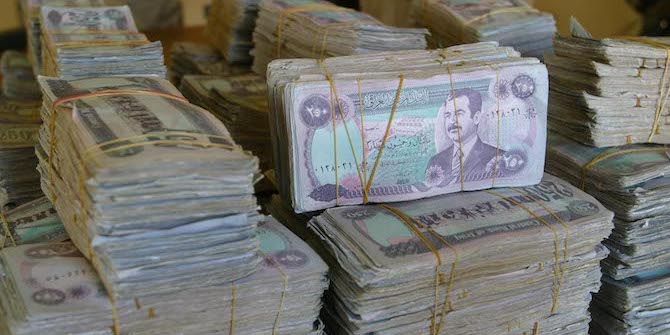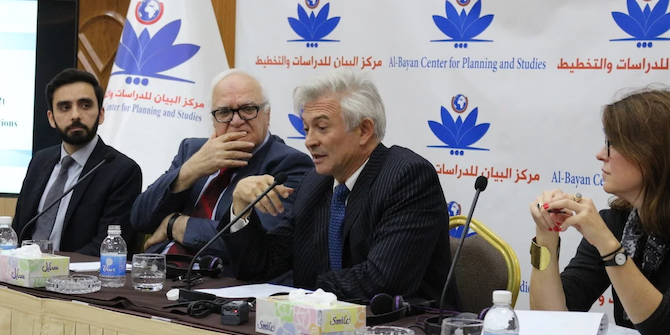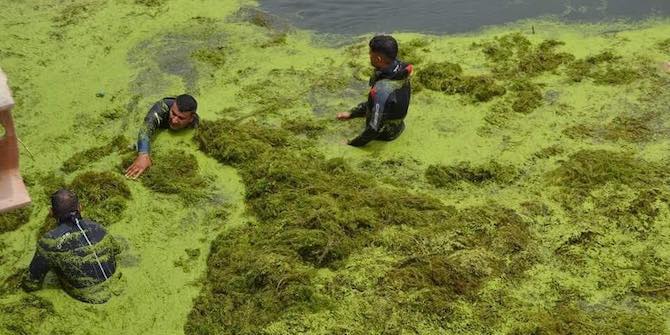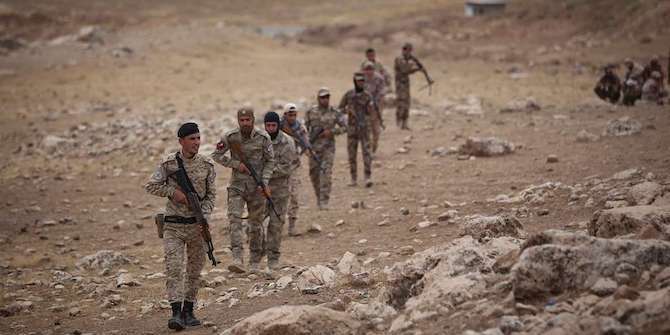by Pieter-Jan Dockx
As Prime Minister Haider al-Abadi arrives in Mosul to claim victory over ISIS, commentators have started speculating over what comes next for the country. Pieter-Jan Dockx argues that while the threat from ISIS has been neutralised, further repression and political exclusion of the Sunni community, the root cause behind the rise of the Islamic State, may lead to a new Sunni insurgency in the country.
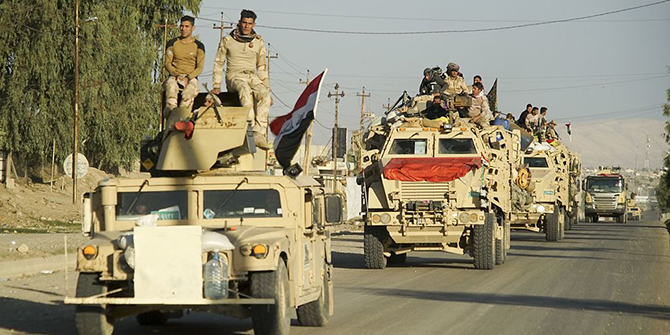
In a previous article on ISIS, I argued that the rise of the group was a direct consequence of Sunni repression and political exclusion by the Nouri al-Maliki’s regime. Maliki excluded the Sunni community from power by installing his Shia allies in key positions of government. When this exclusion led to protests in 2011, he responded to the calls for change with mass arrests and violence.
While al-Abadi has replaced al-Maliki as Prime Minister of Iraq, the elements of repression and political exclusion have persisted, paving the way for an even fiercer Sunni insurgency.
Sectarian Atrocities
The counterinsurgency efforts intended to remove ISIS from the country are accompanied by a high degree of violence and repression aimed at the Sunni community. While violence is attributed to all groups fighting ISIS, the most prominent actor targeting the Sunni population is the Popular Mobilisation Forces (PMF), an umbrella organisation of predominantly Shia militias under the authority of the Iraqi state but with strong ties to Iran.
Recently, during the battle for Mosul, The New Arab released reports by Kurdish photographer Ali Arkady who tagged along with the Rapid Response Division, a national security body infiltrated by the PMF’s Badr organisation. He documented how these forces raped, tortured and murdered not only the local Sunni population but even their allies from the Sunni Mobilisation Forces.
Members of the armed forces openly discuss this violence towards Sunnis in Mosul. For example, a journalist of The New Arab has been reported to overhear a conversation between army officers who laughingly talked about assaulting women and looting homes. An Iraqi officer even admitted to the crimes attributed to the army and the Shia militias, and considered them so bad ‘even IS stands aloof [from perpetrating them]’.
This cruelty aimed at the Sunni population is not unique to the ‘liberation’ of Mosul, but was also present in other cities and towns recaptured from ISIS. After retaking Tikrit from ISIS in March 2015, Shia militias deliberately destroyed homes and shops. For example, in al-Dur, a village south of Tikrit, over 600 houses and stores were torched and demolished by the PMF after having pushed ISIS out of the village.
In June 2016, during the operations to retake Fallujah and its surrounding areas, the PMF abducted 643 Sunni men of fighting age, who are missing to date. Other men were brought to the infamous ‘yellow house’ where they were beaten with metal rods and shovels and were then left to die.
Sectarian violence is not only perpetrated by Shia militias. the Kurdish Peshmerga fighters are also being accused of violence towards the Sunnis. On the frontline between Erbil and Mosul, the Peshmerga are responsible for the destruction of complete Arab villages. This is done both out of revenge for Sunnis support to ISIS, and to ensure the Arabs don’t return to their villages so that an ethnically cleansed Kurdistan can arise from ISIS’ ashes.
Political Exclusion
With the prospect of provincial elections later this year and parliamentary elections in 2018, the element of Sunni political exclusion has not disappeared from the Iraqi polity. Apart from being the main military actor, Shia militias are attempting to become Iraq’s dominant political actor. Keeping in mind their records of sectarian violence on the battlefield, this phenomenon could prove detrimental for Sunni political rights.
In May of this year, the Iraqi electoral commission allowed the League of the Rightous, one of the PMF’s most infamous pro-Iran militia, to form its own political party. The militia is also close to Nouri al-Maliki who was majorly responsible for the marginalisation of the Sunni community. This could be telling of the group’s political views.
The PMF are also negotiating with the ruling Shia National Alliance, the biggest parliamentary faction of which Maliki’s State of Law Coalition is also a part, to field candidates for the 2017 and 2018 elections.
In cities ‘liberated’ by the PMF, the group has also established local branches. While the exact motive behind this endeavour is unknown, it might be seen as a way to gain political leeway, to consolidate Iran’s influence and to ‘annihilate Sunni identity’. Whatever the intention, their presence will be perceived as a provocation towards the local population.
Apart from the militias entering politics, sources confirm that Nouri al-Maliki will be pursuing a comeback to Iraq’s highest office in the 2018 elections. When the National Alliance’s Ammar al-Hakim’s leadership term comes to an end, Maliki is expected to be his successor. As the head of the biggest parliamentary group, Maliki will be perfectly placed to regain the Iraqi premiership next year.
Maliki, whose policy of Sunni marginalisation laid the foundation for the rise of ISIS in Iraq, is also backed by a large proportion of the PMF. The popularity gained by the PMF amongst Iraq’s Shia community by defeating ISIS could act as the final push for Maliki’s electoral success.
As Maliki is regaining prominence in Iraqi politics and the sectarian PMF are entering the political spectrum, Sunnis are fearful of further exclusion from political power. This, combined with the high levels of violence the community has endured during the battle against ISIS, could very well lay the groundwork for a new and possibly fiercer Sunni insurgency.
 Pieter-Jan Dockx is an LSE graduate in Conflict Studies. His main research areas include Middle East and South Asian politics. Read more of his blogs at www.pieterjandockx.com.
Pieter-Jan Dockx is an LSE graduate in Conflict Studies. His main research areas include Middle East and South Asian politics. Read more of his blogs at www.pieterjandockx.com.



